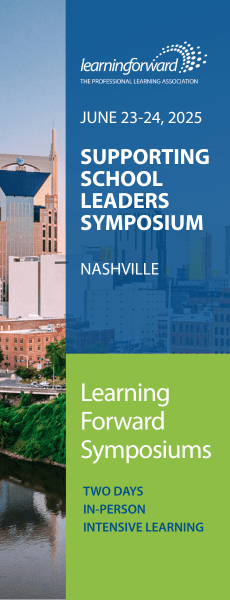NETWORKS AT WORK
Educators engage with curriculum as learners
By Elizabeth Foster
Categories: Collaboration, Continuous improvement, Improvement science/networks, Instructional materials/curriculumDecember 2023
Throughout October, three districts kicked off their participation in Learning Forward’s Curriculum-Based Professional Learning Network. Teams of math teachers, math instructional coaches, principals, and district leaders collaborated with Learning Forward to begin strengthening the implementation of the Illustrative Math curriculum for their districts’ middle schools. Putting themselves in the roles of both students and teachers, they began to shift their practices and plan for a process of ongoing improvement.
As we described in the last issue of The Learning Professional (Bowman, 2023), network members — the School District of Philadelphia (Pennsylvania), Montgomery County (Maryland) Public Schools, and Metro Nashville (Tennessee) Public Schools — are working to improve the way they support teachers to use their relatively new math curriculum. This means moving beyond typical silos that separate curriculum and professional learning departments and shifting from workshop sessions to job-embedded professional learning centered on high-quality instructional materials.

In the Curriculum-Based Professional Learning Network, teachers experience the same kind of inquiry-based learning we expect them to provide for their students. Engaging with the curriculum as active learners supports teachers to change their instructional practices, test new ways of approaching content, and challenge their beliefs. Immersing teachers in the curriculum as students is a valuable learning model to transform practice, especially in the early phase of curriculum use (Klein & Riordan, 2011; Loucks-Horsley et al., 2003; Short & Hirsh, 2021).
How can teachers experience the same kind of inquiry-based learning we expect them to provide for students? Put them in the learners’ shoes.

 https://bit.ly/3NOxrnO #Education #Learnbydoing #TheLearningPro Share on X
https://bit.ly/3NOxrnO #Education #Learnbydoing #TheLearningPro Share on X
During the kickoff meetings, district teams spent two full days with Learning Forward’s networks team, learning about improvement methods and math instructional practices. Network participants became 7th-grade math students, exploring how to understand and develop scaled replicas of an American flag as they experienced an Illustrative Math unit on proportional relationships and percentages. They talked together about what “scaled versions” means, how and why to increase and decrease percentages, and how some of us may have forgotten how to multiply fractions. These “7th graders” then shared with the class how they took a standard-sized flag and created a scaled version for a stamp or a space shuttle. Participants then stepped out of the student role to make observations about the “teacher’s” facilitation, including supporting questioning, productive struggles with the content, and collaborative meaning-making.
Grounded in classroom teachers’ input about their day-to-day experiences with implementing the middle school Illustrative Math curriculum, teams also explored strategies and change ideas related to their own context — things like focusing student dialogue on mathematical language, engaging student learners with a range of prior experiences, and the challenge of maintaining the desired pace of instruction when faced with fire drills, assemblies, and other unexpected interruptions.
During the kickoff meetings, participants also learned about continuous improvement strategies. They dug into plan-do-study-act (PDSA) cycle planning and engaged in structured conversations to narrow the focus of the problem they want to solve, generate change ideas, and begin planning for an inquiry cycle. They learned how their change cycles yield data that can help them decide whether to adopt the change going forward, adapt the idea or strategy and retest, or abandon an idea that seemed promising but did not yield any improvement. Over time, multiple PDSA cycles build a body of evidence about what works, especially when there are multiple teams in each district and multiple districts in a network, as there are in the network.
As with the math content, participants explored these continuous improvement strategies in interactive, experiential ways. For example, to practice PDSA cycles, teams worked together in an iterative process to assemble a toy. As they did so, they talked about how small-scale changes can impact the desired outcome and how important it is to articulate your prediction for how the change might improve the outcome and reflect on what actually happened so you can learn and adjust for future cycles. Calling on Learning to Improve (Bryk, 2015), the Learning Forward Networks team emphasized the value in learning from clearly identified change ideas, failing quickly if you are going to fail, and documenting what the team is learning along the way so that hindsight does not cloud anyone’s perception of what happened.
Each team is now receiving frequent technical assistance and support from the Learning Forward Networks team, as well as virtual opportunities to discuss and learn from the other participating districts. All of the district teams came together at a full-day session at the Learning Forward Annual Conference to share data and reflections from their PDSA cycles, discuss what they are learning, and have role-alike conversations with educators from other districts in addition to collaborative work time with their own teams. The district teams are already poised to make important contributions to the emerging field of curriculum-based professional learning.
Multiple PDSA cycles build a body of evidence of what works, especially with numerous teams in each district and many districts in a network. bit.ly/3NOxrnO #collaboration #TeacherTwitter #TheLearningPro Share on X
build a body of evidence of what works, especially with numerous teams in each district and many districts in a network. bit.ly/3NOxrnO #collaboration #TeacherTwitter #TheLearningPro Share on X
The Curriculum-Based Professional Learning Network is supported by a grant from the Carnegie Corporation of New York. Districts’ work is grounded in Learning Forward’s Standards for Professional Learning and The Elements: Transforming Teaching Through Curriculum-Based Professional Learning by James Short and Stephanie Hirsh.
References
Bowman, M. (2023, October). Network advances curriculum-based professional learning. The Learning Professional, 44(5), 12, 14.
Bryk, A.S., Gomez, L.M., Grunow, A., & LeMahieu, P.G. (2015). Learning to improve: How America’s schools can get better at getting better. Harvard Education Press.
Klein, E.J. & Riordan, M. (2011). Wearing the “student hat”: Experiential professional development in expeditionary learning schools. Journal of Experiential Education, 34(1), 35-54.
Loucks-Horsley, S., Love, N., Stiles, K.E., Mundry, S., & Hewson, P.W. (2003). Designing professional development for teachers of science and mathematics (2nd ed.). Corwin Press.
Short, J. & Hirsh, S. (2021). The elements: Transforming teaching through curriculum-based professional learning. Corwin.

Elizabeth Foster is the senior vice president of research and strategy at Learning Forward. She leads the organization’s research efforts for partnerships, programs, and fundraising. Elizabeth co-wrote the Standards for Professional Learning (2022) with Tracy Crow and now facilitates learning sessions about the standards and develops resources that support their use and implementation.
Categories: Collaboration, Continuous improvement, Improvement science/networks, Instructional materials/curriculum
Recent Issues
LEARNING DESIGNS
February 2025
How we learn influences what we learn. This issue shares essential...
BUILDING BRIDGES
December 2024
Students benefit when educators bridge the continuum of professional...
CURRICULUM-BASED PROFESSIONAL LEARNING
October 2024
High-quality curriculum requires skilled educators to put it into...
LEARNING TO PIVOT
August 2024
Sometimes new information and situations call for major change. This issue...












